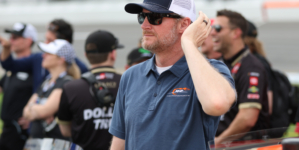-
Earnhardt Jr. pays touching tribute to Dr Jerry Petty after “friend of NASCAR” passes away - 39 mins ago
-
Trump Administration Continues to Defy Judge’s Orders in Abrego Garcia Case, Lawyers Say - 44 mins ago
-
How to Watch Panthers vs Lightning: Live Stream NHL Playoffs, TV Channel - about 1 hour ago
-
A Simpler Funeral for Pope Francis, Who Shunned Many Papal Trappings - about 1 hour ago
-
Neil Gorsuch, John Roberts Could Give Harvard a Win Over Trump - 2 hours ago
-
Feds say L.A. gangster spoke of ‘the orange man,’ wanted Trump to intervene in case - 2 hours ago
-
Trump Promised ‘Big, Beautiful’ Deals. Delivering Has Been Tougher. - 2 hours ago
-
BetMGM Bonus Code NEWSWEEK1500: NBA Playoffs Resume Tonight, Get $150 Promo - 2 hours ago
-
Pope Francis’ funeral is set for Saturday. - 3 hours ago
-
Rubio Skipping Ukraine Talks as Zelensky Rebuffs U.S. on Crimea - 3 hours ago
We Are Pope Francis’ Legacy | Opinion
Pope Francis, who passed away on Monday, never led from above. He stood among us.
In Buenos Aires, he gave up the chauffeured limousine customarily used by the city’s archbishop—and rode public transportation every day for 40 years. In Rome, he gave up grandeur for humility. To the very end he was a shepherd who, as he often put it, smelled like his sheep.
Catholics believe the pope is the Vicar of Christ—the visible sign of Jesus on Earth. More than anyone I’ve ever known, Pope Francis reminded me of Jesus.
Then again, I guess that’s the point.
Jesus called him, like every pope before him, to be Peter—the rock of the Church. We called him our father, our brother, and our friend.
But Francis didn’t just lead the Catholic Church. He invited the world to follow a different kind of leadership, one built on humility, not hubris.
Now, as the world grieves, the urgent question is not how we will remember Pope Francis, but how we will live because of him.
From the first hours of his papacy, Pope Francis signaled a change. He declined the luxurious Apostolic Palace in favor of a modest guesthouse. He swapped the papal limousine for a Ford Focus. He paid his own hotel bill the night he became pope. And when he visited Washington, D.C., he skipped a power lunch with lawmakers to share a meal with the homeless.
These were not gestures of political theater. They were acts of conscience.
Francis believed that credibility doesn’t come from prestige—it comes from proximity to suffering. He called priests to carry “the smell of the sheep.” He lived what he preached.
He didn’t seek to be a celebrity pope. In a cynical age starving for integrity, the authenticity of his life spoke louder than any sermon.
Early in his papacy, Francis was asked about gay priests. His response—”Who am I to judge?”—reverberated across the globe. It marked a dramatic shift in tone and posture. He wasn’t rewriting doctrine, but he was rewriting the conversation: less fear, more welcome. Less condemnation, more encounter.
Over and over again, Francis extended this logic of mercy. He insisted the Church should be a “field hospital,” where wounds are tended before rules are recited. He declared that “the Eucharist is not a prize for the perfect, but a powerful medicine for the weak.”
And when asked who belongs in the Church, he answered in Spanish, simply: “Todos, todos, todos”—everyone, everyone, everyone.
But, of course, Pope Francis didn’t just pastor the faithful—he challenged the powerful.
He called on leaders to take responsibility for reversing the pollution that made our planet look like a “pile of filth.” He declared justice for the poor to be not a suggestion, but a moral imperative. He reminded the world that economic systems without mercy would ultimately devour themselves. He denounced a “throwaway culture” that discarded the poor, the unborn, the elderly—anyone who couldn’t produce or consume.

YASUYOSHI CHIBA / AFP/Getty Images
At every turn, Francis chose radical inclusion over rigid control, and conscience over comfort.
He visited refugee camps, kissed the faces of the sick, and washed the feet of prisoners, Muslims, women—the people our society often ignores. He condemned what he called a “globalization of indifference” and called the Church to become a community of mercy, not a museum of moralism.
And still, through all this, he remained rooted in the gospel basics: humility, tenderness, truth. He reminded the world that the Christian faith—practiced correctly—always sides with the vulnerable.
One of the most poignant moments of Pope Francis’ final years came during an interview with Norah O’Donnell last May. When O’Donnell asked the pope what he hoped his legacy would be, he didn’t mention reforms or speeches or titles. He replied: “The Church is the legacy. The Church—not only through the pope, but through you, through every Christian, through everyone.”
That answer says it all. Pope Francis never wanted a monument. He wanted a movement. He wasn’t asking to be remembered—he was asking us to continue. His hope wasn’t in history books, but in the daily choices of people willing to carry his mission forward.
The call to be Pope Francis’ legacy extends beyond the confines of the Church. It’s an invitation to all.
It’s about belonging to the kind of world Jesus proclaimed: One where mercy outweighs judgment. Where power bows to service. Where we seek not dominance, but dignity—in how we live, how we lead, and how we treat one another.
In practice, that means listening before speaking. Embracing humility over pride. Standing with the poor, the stranger, and the forgotten. Rejecting cruelty, and living gently and justly instead.
I’m a political operative, but let me clear: the defining struggle of our age is not political—it is spiritual.
It’s a contest between two models of leadership: one built on ego, and one built on empathy. One that clings to status, and one that stoops to serve. Pope Francis embodied the latter. Now it’s up to us to choose which one we carry forward.
We need leaders who stoop before they speak. Who measure greatness not by how high they climb, but how low they bend to lift others. Who serve without spectacle.
In our homes, churches, and public life, we need a new standard—one that understands mercy is strength, humility is courage, and love is power.
We don’t need to mythologize Francis to honor him. He was the first to admit his flaws—when asked who he was, he famously answered, “I am a sinner.” He often fell short of the Gospel ideals he preached. But that was part of his power: he never claimed perfection, only purpose.
He took his ideals seriously—and now the question is whether we will do the same.
Pope Francis lit a fire in the world’s conscience. Our task is to keep it burning—not with grand gestures, but through the quiet, steady work of compassion and courage.
We are Pope Francis’ legacy.
Christopher Hale is a Democratic operative from Tennessee. He led national Catholic outreach for President Obama’s reelection campaign and served as the cofounder of Catholics for Harris.
The views expressed in this article are the writer’s own.
Source link














